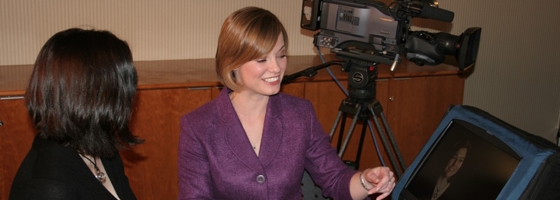A large part of what I do is critique people’s performances– either on-camera, in-person or online. My twitter friend, @paisano, knows this and often asks for a media interview critique of people’s television news appearances.
Typically I say, “Do you know how much I charge for this kind of critique?” And he says, “I know. Thousands of dollars.” But since he helps me with my IT issues, I usually indulge him.
Today I thought I’d share a media interview critique of a woman’s television news appearance that @paisano asked me to watch. It’s a great example of why people need media training. A little coaching likely would have made a big difference in this woman’s professional life. (It’s a long critique, but with the holidays I didn’t want to break it up into a bunch of parts.)
The woman, whom I won’t name, is someone that I follow on twitter. Never having met her, I was curious how she would do, especially since she spent so much time promoting her appearance on twitter. The bad news: she wasn’t very good. The good news: with some coaching she could be really good.
CRITIQUE
On the positive side– she had good content. And for the most part, she was well spoken. She stumbled over some words, but it was nothing that would stop me from listening. What would stop many people from hearing what she had to say was her appearance.
Before I continue–let me just say– it would be great if looks and appearance didn’t matter. The reality is that they do. Sadly, they count more than intelligence and content. If you don’t look professional and polished, people will not see you as an expert in your field.
LOOKING PROFESSIONAL
When I worked at CNN, a memo went out to all of the writers in the newsroom in Atlanta about their attire. The Executive Producer was sick of seeing people in grubby jeans and t-shirts in the background on bump shots of the newsroom. Yet he never yelled at anyone. He simply put out a memo, reminding people to dress more professionally. He ended the memo with a line I have never forgotten: “Dress as seriously as you want to be taken.”
AVOID BLACK AND WHITE ON-CAMERA
Sadly the young woman didn’t follow his advice. She wore a shirt that would be more appropriate for a night out at a club. For starters, it was black–one of the two worst colors you can wear on-camera. (White is the other.) Second, it had very large shiny, metallic sequins around the collar. That’s fine for going clubbing, but not for a television news interview where you’re hoping to be seen as an expert in your field.
HAIR AND MAKEUP
Unfortunately she didn’t do much better with her hair and makeup. Her hair was pulled back in a weird ponytail and her bangs were very long, falling into her eyes. While that may be a great look off-camera—it is disastrous for an on-camera news interview. Viewers need to see your eyes to determine whether they’re going to trust you. If they can’t see them, chances are they won’t.
Next—the woman didn’t have on much makeup, never mind enough for television. Worse still- what she had on wasn’t good. Her very bright pink lipstick made her thin lips look even thinner. That bright color also highlighted the fact that she didn’t have on much makeup. She also wasn’t wearing mascara, so her eyes looked droopy. The overall effect was that she looked tired.
POSTURE/ NERVOUS HABITS
Beyond that, the young woman kept getting up and out of her seat. Perhaps she was sitting on her legs in her chair or trying to get comfortable. Either way she looked like a fidgety toddler. She also kept playing with her bangs, running her fingers through them. Perhaps she was trying to see out past them?
MEDIA INTERVIEW CRITIQUE
Why am I being so mean? I’m really not. I’m trying to teach people to make the most of their opportunities. If someone calls you to be interviewed on a news show, get your hair and makeup done by a professional. (Clearly this young woman knew she was going to be on the show because she promoted her appearance on twitter for a few days.)
Remember– the goal is to look as polished and professional as you can. Then focus on your messaging and what you’re going to say. Anticipate the questions that will be asked and think about how you’ll answer them. You need to both look good and sound good if you want to be successful on-camera.
BOTTOM LINE
In a nutshell, the woman is an example of why people need media training. She came across as very young– lacking in polish, credibility and professionalism. And it’s a shame because with some coaching–she could be really good. She is bright and attractive. And she shared good information. But her appearance was distracting. It diminished her ability to communicate her message and most likely sabotaged any future live interview opportunities with that news station.
Contact Us
If you would like to read more of our tips, check out our other media training blogs.
If you think that you would benefit from some media training or a media interview critique, please contact us about our executive media training, executive on-camera coaching or executive presentation skills training services. We would be delighted to customize a program that fits your exact needs.
Chicago-Based, National and Online Options
While we are based in Chicago, we often travel to both coasts to work with executives. We also offer online coaching for those who prefer to work with us remotely.

